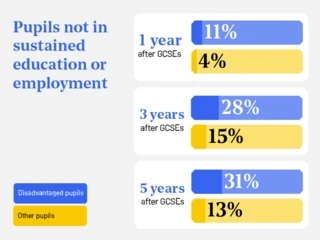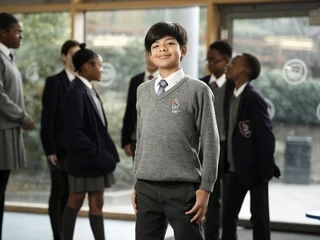
Closing the gap
A manifesto for the new Government
Time to act
Children experiencing poverty in the UK are still on average 18 months behind their peers in school.
They have the potential to succeed. But not the opportunities.
They have dreams. But without the support they need, these go unfulfilled.
In fact, they have a significantly greater chance of ending up out of education or employment entirely in the long-term.
This needs to change.
We need to close the attainment gap putting our children’s futures at risk.

Post-school destinations
There are growing disparities in post-school success for disadvantaged students, underlining the urgent need for targeted interventions.
The latest long-term data from the Department for Education shows that the gap between disadvantaged pupils and their peers widens over time:
- 1 year after GCSEs: 11% of disadvantaged pupils were not in sustained education or employment, compared to 4% of other pupils - a 7% difference.
- 3 years after GCSEs: This difference increases to 13%.
- 5 years after GCSEs: The gap grows further to 18%.
These statistics highlight the critical need for focused support to bridge this gap and ensure better outcomes for all students.

A chance for every child
Now is the time to prioritise an education system where every child can fulfil their potential.
We know there are huge challenges facing our education system.
Schools are taking on more and more responsibilities beyond teaching – and on much tighter budgets.
Our latest research shows that four-fifths of teachers spent more time helping pupils with mental health issues over the past academic year, while a third (36%) of teachers believe their school will reduce the number of teaching staff to help reduce spending.
If our politicians are serious about eliminating the attainment gap and creating a fairer society, we must see manifesto pledges that tackle three key areas: inspiring teachers, equipping schools and a greater focus on addressing child poverty.
The next government should weight additional resources towards schools serving disadvantaged communities - where it has the potential to make the biggest difference.
- Russell Hobby, CEO, Teach First
Schools Week, Labour's Priorities, 5 July 2024
INSPIRE
the next generation of teachers, incentivising them to work where they’re needed most.
EQUIP
schools serving the most deprived communities with the funding and resources they need.
STRATEGISE
to eradicate child poverty and improve public services for young people.
Our report, Ending Educational Inequality sets out three key recommendations to make this ambition a reality:
INSPIRE
Develop and implement an ambitious teacher recruitment and retention strategy that is fit for the future, modernising teaching as a profession.
Evidence proves that great teaching is the most important lever schools have to improve outcomes for their pupils.
The first step is recruiting those teachers.
- Ensure a strategy focuses on Gen Z graduate recruits as the backbone of the future teaching workforce to lay the foundations of a long-term approach, which includes increasing teacher trainee salaries.
- Build on flexible working innovations and success by demonstrating leadership through championing best practice and creating a ‘flexible work culture’.
- Implement a creative and evidence based training offer for teachers, including offering secondments to broaden and deepen subject knowledge and bring more inspiring experiences and varied learning approaches into the classroom.
- Diversify routes to entry and reduce costs of training through Teacher Degree Apprenticeships.
- Apply the successes of the NHS Workforce Plan to ensure a comprehensive pipeline of teachers to address issues in the sector, like shortage subjects such as STEM.
We work incredibly hard to attract and retain our brilliant teachers, ensuring they feel valued, rewarded and regularly refreshed with a competitive salary and flexible working hours.
EQUIP
Target funding towards schools supporting the highest levels of pupils eligible for free school meals (FSM) through the pupil premium.
The funding advantage for schools serving the most deprived communities fell by 10% between 2010 and 2021. Reversing this trend is vital for schools to be able to deliver evidence-based interventions that we know close the attainment gap and improve destination outcomes for young people, especially those facing persistent disadvantage.
- Increase the pupil premium rates to 2015-16 real term levels for primary and secondary school pupils and a guarantee that rates will continue to rise in line with inflation.
- Create a new pupil premium subcategory for ‘persistently disadvantaged’ pupils who have been eligible for free school meals for 80% or more of their school life, increasing the rate of funding that they receive by at least 50%.
- Extend pupil premium to include those aged between 16 and 19 in full-time education.
- Spending should be underpinned by a long-term strategy with the specific goals of eliminating the in-school attainment and future destination gaps.
We want our pupil premium students to be the very best they can be, and know these effective interventions meet their varied needs and help them get to where they want to be.
STRATEGISE
Establish a Cabinet Committee to create and implement a cross-departmental ‘children’s strategy’ that works towards eradicating child poverty and improves public services for young people.
The effects of poverty and stretched children’s services are felt within the school gates. There needs to be a significant and sustained uplift to local government funding for children’s and young people’s services, so that teachers can focus on teaching, and wider support services can be provided by the expert practitioners.
- Grant urgent funding to vital children’s services such as CAMHS, mental health, and SEND support to address the postcode lottery of service delivery.
- Ensure funding is available for wider support services and for schools to be able to employ specialist, non-teaching support staff, that are necessary for their local needs.
- Provide robust CPD opportunities for teaching assistants to specialise in key classroom areas such as SEND, reading, or behaviour, alleviating pressure on teachers, and support the progression of a considerable and valued section of the workforce.
By making the necessary interventions and investments in our schools and our teachers, we have the power to break the cycle of inequality and unlock the boundless potential of every child, regardless of their background.
We need to relieve teachers by ensuring schools can employ and train the right mental health, pastoral and SEND support staff.
For a better tomorrow
These changes have the potential to transform millions of young people’s futures.
It’s not an easy fix.
But we know that it works.
We urge all political parties to invest in our nation’s children - to give those facing the biggest barriers the opportunities they deserve and empower them with the tools they need to pursue the future they desire.
It is this investment that will create a future of choice and opportunity for all.

Take action
Join the conversation online. Follow Teach First on social media and like or share our posts to help tackle educational inequality.
Raise funds
Help give every child the opportunities they need to thrive in school and beyond.
Sign up to Run the River in 2025.

Train to teach
Want to create lasting change for children experiencing poverty? Why not train to teach?
Find out more about our Training Programme.
